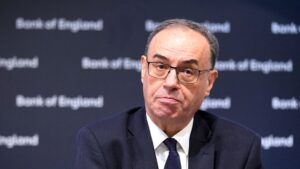Understanding the Economic Landscape: Insights from the Bank of England
At Extreme Investor Network, we strive to keep you at the forefront of economic trends and market movements. Recently, Bank of England Governor Andrew Bailey shared significant insights regarding potential tariffs that the U.S. might impose and their repercussions on global economic dynamics. Let’s delve deeper into these vital observations.
The Ripple Effects of U.S. Tariffs
Governor Bailey emphasized that even if the U.K. isn’t a straightforward target for U.S. tariffs, it undoubtedly would still "have an effect." This statement highlights the interconnectedness of the global economy—where decisions made in one major economy can send ripples throughout others, impacting growth and inflation worldwide.
During an interview with CNBC, Bailey addressed the potential for tariffs to fragment the global economy, which he indicated would have dire consequences for worldwide growth. He articulated that while the impact on inflation could be more ambiguous, it largely depends on how other nations react and the subsequent effects on global trade.
The ramifications of U.S. trade policies are not limited to the U.K. alone. They represent a broader dilemma affecting international relations and commerce. As investors, it’s crucial to stay informed about how changes in U.S. tariffs might alter trade dynamics, potentially leading to both opportunities and challenges.
The U.K. Trade Landscape: A Closer Look
Recent statistics reveal that the U.S. is the U.K.’s largest trading partner, constituting over 17% of the U.K.’s total trade as of September 2024. This relationship is particularly interesting because despite President Donald Trump’s concerns about trade deficits, the trade figures between the two countries are relatively balanced. This balance is crucial as it positions the U.K. more favorably in trade negotiations.
Furthermore, Bailey pointed out that services represent a significant portion of the U.K.’s trade, an area that traditional tariffs affect differently than physical goods. This nuance provides the U.K. with a strategic advantage, as the landscape is complex, and opportunities may exist in service-oriented sectors even amidst tariff discussions.
A "Gradual" Approach to Monetary Policy
In a related economic context, the Bank of England has recently reduced its benchmark interest rate by 25 basis points to 4.5%. This decision came with the overwhelming support of the monetary policy committee (MPC), showcasing a consensus towards a cautious approach in navigating current economic uncertainties.
Bailey characterized the interest rate cut as “careful” and “gradual.” This approach is not just a matter of monetary policy but reflects the broader economic landscape where risks loom large. The Bank of England has halved its growth projection for 2025 from 1.5% to 0.75%, citing a stagnation in economic growth, evidenced by a marginal GDP increase of only 0.1% in November 2024.
For investors, these insights signify a critical moment to reassess strategies. A gradual monetary policy can signal a slower recovery trajectory, influencing everything from bond yields to equity valuations.
Key Takeaways for Investors
-
Monitor U.S. Tariff Developments: As tariffs can significantly impact international trade, stay informed about potential changes in U.S. trade policy and their global ramifications.
-
Track Service Sector Trends: With the U.K. relying heavily on services, consider investments that capitalize on strengths in this sector.
-
Evaluate Rate Cuts Carefully: Interest rates can impact the cost of borrowing and consumer spending. Adjust your investment strategies accordingly by paying attention to central bank communications.
- Focus on Long-term Growth: Given the current projections for slow growth, investors may want to engage in more defensive investment strategies, ensuring portfolio resilience against volatility.
At Extreme Investor Network, we are committed to offering you profound insights and personalized strategies to help you navigate these complex economic waters. Stay tuned for further analyses and actionable advice to make informed investment decisions in this evolving economic environment.

